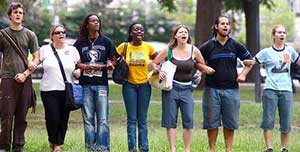In defense of abortion clinic
Women activists lead fight against right-wing
By
Kathy Durkin
Published Aug 6, 2006 8:14 AM
During the week of July 15-22, the right-wing
in Jackson, Mississippi, was set back by strong pro-choice forces who gathered
to protect the Jackson Women’s Health Organization—the only clinic
in the state that performs abortions.
|
Activists defend
abortion clinic in
Jackson.
Photo: Mississippi Reproductive Freedom Coalition
|
“I feel very victorious. There
were no arrests, nor was anyone hurt. The clinic didn’t close down. And we
got a lot of support and made friends in the community,” Michelle
Colón, president of Jackson-area NOW and member of the Mississippi
Reproductive Freedom Coalition, told Workers World.
Women’s rights
activists sprang into action when they learned that “Operation Save
America,” formerly named “Opera tion Rescue,” led by notorious
reactionary Flip Benham, was coming to Jackson for a week to try to shut down
this facility. Their aim was to make Mississippi the first state to have no
clinics providing abortions, and frighten and intimidate women from exercising
their reproductive rights. The women were determined to stop the right-wingers
who had been trying to shut down this vital clinic for years.
As
Colón explained, “This clinic provides critically-needed
reproductive health care for low-income women.”
In the last ten
years, she said, six clinics in the state had closed due to more restrictive
laws and rightwing pressure. Private physicians’ high fees and public
hospitals’ restrictive policies limit poor women’s accessibility to
services.
NOW and the Mississippi Reproductive Freedom Coalition, which
includes Unity Mississippi, a lesbian, gay, bisexual and transgender
organization, planned a week of pro-choice activism, community outreach and
education about reproductive healthcare. Women from around the state and from
other parts of the country joined in, making up a strong, diverse force of
African-American and Asian women and men, LGBT people, and many youth—all
opposed to the rightwing attack.
The week of progressive actions started
on July 15, when hundreds of women’s rights activists rallied at Smith
Street Park in Jackson, outnumbering the reactionaries by ten-to-one. Despite
bomb threats and attempted disruptions, the pro-choice rally was held.
Supporters there included representatives of Anti-Racist Action, Common Ground,
The World Can’t Wait, Radical Women, the Religious Coalition for
Reproductive Choice, Mid-South NOW, Feminist Majority, and many pro-choice
activists and supporters from throughout Mississippi and beyond.
While in
Jackson, the small group of bigots incensed the whole city. With messages of
extreme hatred, they vociferously attacked women’s right to choose, the
lesbian and gay community and Islam. They harassed the clinic’s staff and
clients for eight days with verbally abusive tirades, slurs, signs, and
photographs. They harassed churchgoers and drove a car into a crowd of youth.
They even burned the Koran and shredded a rainbow gay pride flag. But
these attempts to whip up bigotry and hostility backfired when Jackson residents
became outraged at their actions.
Also, solidarity began growing between
divergent forces. This was demonstrated at the State Capitol on July 21, when
many groups with different views gathered to decry the rightwing and
“defend one another when we saw bigotry, hatred and violence being incited
by the other side,” said Colón.
The week of activism
concluded the next day with a March for Women’s Lives that gathered at the
State Capitol in memory of women who had died from botched abortions
worldwide.
But the struggle is far from over. Mississippi is a key state
in the national struggle for reproductive rights and one of the most restrictive
in the country, where as in many states, low-income and young women face the
toughest hurdles in getting their reproductive health care needs met.
State officials there seek a strict abortion ban or at least a
reduction in abortion access. The Democrats and Republicans
officially oppose abortion rights. In March, rightwingers in the
state legislature, where the balconies were packed with
reproductive rights activists and supporters, tried to, but
failed to pass a restrictive abortion ban. Alleged pro-choice
legislatures caved-in to the other side and abstained on the vote
on the ban.
But Colón expressed her optimism about
the struggle ahead for crucial women’s reproductive rights as the
pro-choice movement develops in her state. She told of the formation five
months ago of the Mississippi Reproductive Freedom Coalition, when “a
small group of women of color came together then, and for a whole month, we
outnumbered anti-choice representatives in Jackson.”
Colón
told of the readiness of women activists to mobilize in the months ahead
—against intimidation by rightwing groups, to gain reproductive healthcare
for Mississippi women, especially those who are low-income, and to stop a state
ban on abortion. She told WW that this is a “human rights issue,”
and that “the Mississippi pro-choice voice will fight to provide
reproductive healthcare.”
Articles copyright 1995-2012 Workers World.
Verbatim copying and distribution of this entire article is permitted in any medium without royalty provided this notice is preserved.
Workers World, 55 W. 17 St., NY, NY 10011
Email:
[email protected]
Subscribe
[email protected]
Support independent news
DONATE


